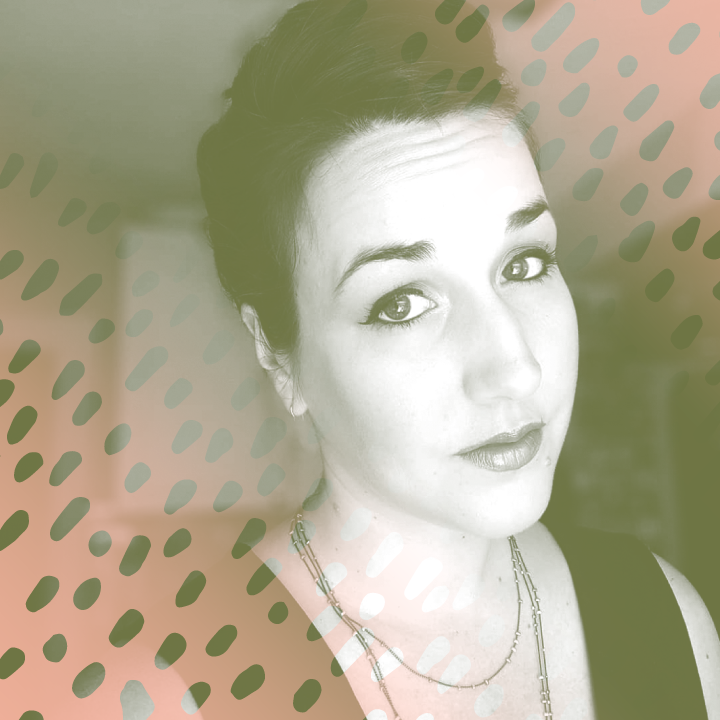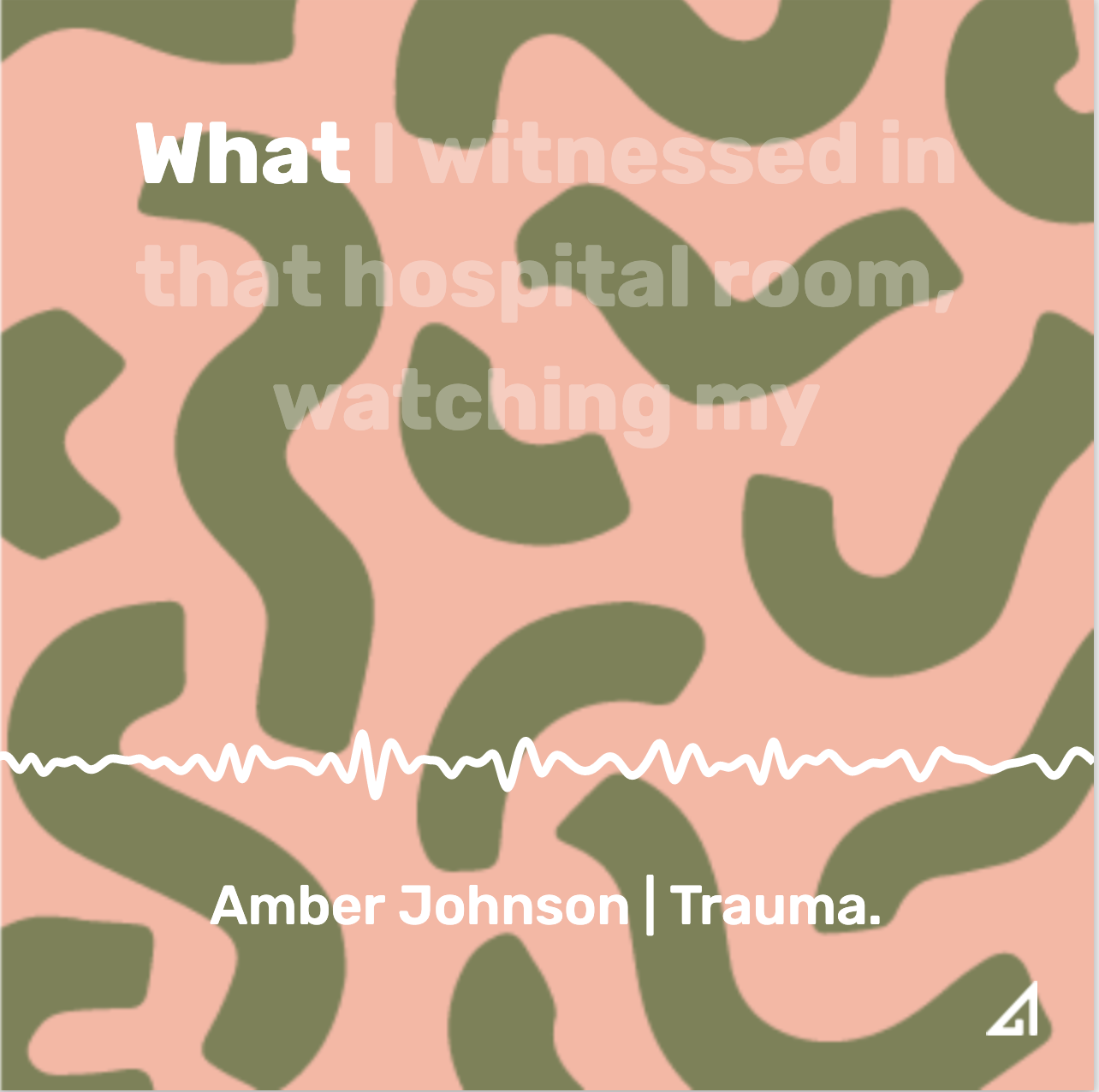AMBER JOHNSON
Amber Johnson is an award-winning filmmaker who recently created and directed Visitation for the Minnesota Fringe Festival. The show explored the grief experience from funny to poetic to painful by mixing performance and video projection. When not filming or directing, Amber can be found raising chickens in her backyard.
Trauma.
Trauma.
If there’s any aspect of grief I wish I would have known about before I experienced it, it is definitely trauma. All I knew of trauma before my brother, and then my father, passed away was what I saw in the movies: characters staring off into space, trippy panic attack sequences, self-destructive behavior, etc. I had no idea what trauma actually was, thinking it only happened to people in wars and terrible car crashes. Evidently, trauma can happen to anyone and, depending on how your brain is wired, it can affect you in any number of ways.
Turns out I have PTSD, which feels like a fraught after-school-special type of admission, but here we are. Post traumatic stress disorder or PTSD is simply when someone has difficulty recovering after experiencing or witnessing a terrifying event.
My terrifying events are as follows: My oldest (of two) brother, Travis, passed away at the age of 33 in the spring of 2013. Six years later, only weeks before the anniversary of my brother’s death, my dad died of cancer.
Travis got very sick from some mysterious disease that caused his liver and kidneys to shut down eventually flooding his brain and body with toxins. When my family arrived at the ICU in Indiana, he was already in a coma. I sat by his side during moments of panic as alarms were going off and his large frame trembled and moments of stillness after the doctors told us he was brain dead and there was nothing they could do. After an autopsy, there still was no answer as to what caused his death.
What I witnessed in that hospital room, watching my brother die who had until then been perfectly healthy, shattered my core understanding of how I thought the world was supposed to work. Nothing made sense. It has taken me years to realize how all of this embedded in me.
After my brother’s funeral, I returned to the house I was renting with two roommates in St. Paul and I went back to living my life as if I was the same person I was a few weeks before. At least that’s what I tried to do. I started having terrible nightmares and panic attacks that were so frequent I was losing the ability to even pretend to function. I’m not entirely sure how I came out the other side. I tried therapy a few times, but I couldn’t really afford it and I didn’t connect with the therapists I met. I had a lot of excuses, but really therapy was just frightening to me and I didn’t want to crack open all the pain I thought I had neatly packed away. I could handle it, I just needed to be stronger, work harder.
I did a ton of yoga, I ran miles and miles, I just needed to keep my body moving. I drank way too much alcohol. I got a job out of town for the summer to get away from it all. I thought I was going crazy. I tried to stay busy. Somehow in the middle of this I started a relationship with a wonderful human who anchored me back into a life where I started to find some calm and happiness. I think one of the main reasons I didn’t destroy myself during this time is that I ended up with this kind, patient man who I’m still with today.
About six years later, thanks to a corporate job with good benefits, I committed myself to giving therapy an honest chance in the hopes of working through some reoccurring issues with anxiety and depression. Just as I was beginning that journey with a therapist I really felt I connected with, I got a call from my aunt that my dad wasn’t well. My dad had been diagnosed with cancer a few months before, but the doctors were confident it could be treated. Everything that we had been hearing was that it was a common cancer and my parents knew a handful of people that made it through treatment and were now perfectly healthy. It was stressful, but my family and I were all thinking it was just going to be a few months of hell and then he’d be fine. We just had to be strong and power through.
I had been calling and visiting regularly to check in and cheerlead and my dad had just finished treatment a month before I got the call from my aunt. My uncle had brought my dad to a check up with his oncologist and the doctor said he was dying from malnutrition. What I didn’t know is that since the last time I had visited my dad, he had wasted away to nearly nothing. I had never known my dad to be a skinny man so I was shocked and horrified the next time I saw him.
Once I got over my shock, I thought all I had to do was roll up my sleeves and get to work making sure he was getting nutrition and managing his care. My mother’s health was failing during this time as well. She was showing early signs of Parkinson’s but was-and still is-in complete denial. She was unable to care for my dad and it became apparent how much my dad had been caring and covering for her over the last year.
What I thought was a pretty straightforward task: just get him to eat. However, it turned into a battle and eventually a realization that the cancer had not been treated but instead had spread to the back of his tongue and throat making it nearly impossible for him to swallow and very difficult to breathe. Again, I found myself hearing from a doctor about how he was so sorry, but there wasn’t anything they could do. We tried chemo as a last dash to shrink the tumor and at least buy more time.
They sent him home. We all mourned and tried to prepare. I kept doing the only thing I knew how to do at the time, which was care for my dad. We tried to stay on a schedule-tube feedings, meds, our evening drives down to the dam to see if the fish are biting. His breathing became more and more difficult and eventually one evening, it just stopped.
He was sitting next to my mom on the couch and he was watching a NCAA basketball game, Purdue against someone. I was setting up his feeding pump and stopped to ask him about the game. He didn’t respond. I quickly realized he wasn’t breathing. I panicked. I tried to clear out his throat. My brother began CPR. My partner tried mouth to mouth. My sister in law called 911. The ambulance arrived and used a defibrillator along with chest compressions. It was chaos, it was hell, and it burned itself into my brain.
After my dad’s funeral, I went back to my life in St. Paul. I thought I’d be fine, I was an old pro at grief by this point, right? Not so much. I had terrible nightmares, panic attacks and I was barely holding together. Luckily, this time I had a professional to talk to and we started a process called EMDR, a treatment specifically for processing traumatic memories. Through this treatment I had the stark realization of how much trauma I endured through my brother’s death as well. I wasn’t crazy, I was just having a common and natural reaction to something very disturbing. Once I began to free myself from all the trauma, it was like being able to see color again after months of seeing only shades of grey.
The reaction to grief and trauma may vary from person to person, but the point I want to make through all of this is that you don’t have to suffer. Grief is painful enough without having to cope with a traumatic experience. So, I’d like to end on this: if you’ve lost someone close to you, whether or not you think the experience was traumatizing, I can’t encourage you enough to seek out a professional you connect with to support you as you grieve. Grief and trauma can break you and it is amazingly helpful to have someone to remind you that you are not alone, you are not crazy and believe it or not, you are going to get through this.


